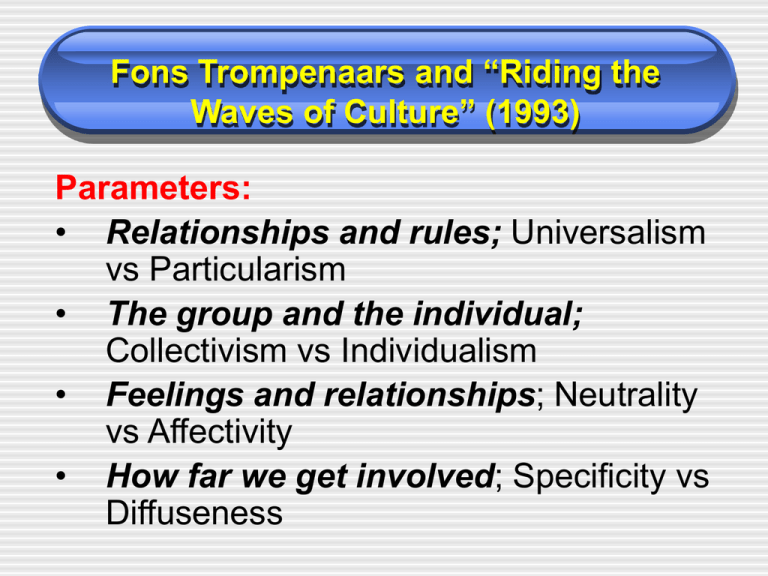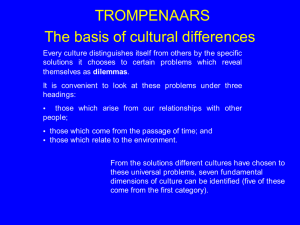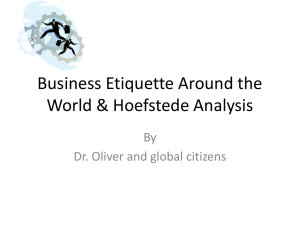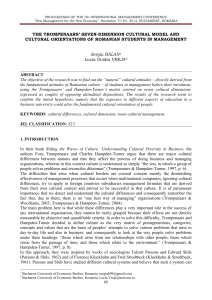Individualism
advertisement

Fons Trompenaars and “Riding the Waves of Culture” (1993) Parameters: • Relationships and rules; Universalism vs Particularism • The group and the individual; Collectivism vs Individualism • Feelings and relationships; Neutrality vs Affectivity • How far we get involved; Specificity vs Diffuseness Trompenaars’ parameters (forts): • How we accord Status • Time orientation • Relation to Nature Explanations Universalism vs. Particularism Universalism: the belief that ideas and practices can be applied everywhere without modification - Germany, USA, Canada, Switzerland, Scandinavia and the UK Particularism: the belief that circumstances dictate how ideas and practices should be applied (exceptions) – Spain, Japan, Italy, South Korea, Venezuela, Russia and Malaysia e.g. “favoritism should be avoided” Neutral vs. Affective To show or not to show your emotions? Neutral: emotions are held in check Japan and the U.S. Affective: emotions are openly and naturally expressed Mexico, Netherlands, and Switzerland e.g. “feeling upset at work” The amount of emotion we show, not what we feel. •Neutral cultures see control of the feelings as a sign of civilization. •Affective cultures allow for emotion to be expressed quite openly. e.g. Americans - tend to exhibit emotion, but separate it from objective and rational behind decisions. Italians and Southern European nations in general both tend to exhibit emotion and but don’t separate them from the objective and rationale. Dutch and Swedes tend not to exhibit and to separate. In Anglo-Saxon (predominantly neutral) cultures - impolite to interrupt In Latin (affective) cultures- more interruptions are OK In some Oriental (neutral) cultures there is often a silence between A speaking and B starting. This is to digest what has been said and is a sign of respect 5 Specificy vs. Diffuseness Specific: individuals have a large public space and a small private space UK, U. S., and Switzerland Diffuse: both public and private space are similar in size Venezuela, China, Spain, Nepal, Indonesia, Thailand, Malaysia and Nigeria E.g. Hate the deed but love the doer (Some cultures prefer to stick to the facts of a situation and not to enter into close relationships, while others want to get to know people better before doing any business) Achievement vs. Ascription Achievement: people are accorded status based on how well they perform their functions U.S., Switzerland, and UK Ascription: status is attributed based on who or what a person is Venezuela and China e.g. Titles, age, family background- young or old representative? Individualism-collectivism ≈ Hofstede Individualism - a prime orientation to the self Collectivism - a prime orientation to common goals and objectives Individualist cultures: North America, Germany, Scandinavia, the UK and Australia. More collectivist cultures - e.g. Nepal, the Middle East Past or Present-Oriented Vs. Future-Oriented Past or present-oriented : emphasize the history and tradition of the culture • Venezuela, Indonesia, and Spain Future-oriented: emphasize the opportunities and limitless scope that any agreement can have • U. S., Italy, and Germany Sequential vs. Synchronous Time Sequential: time is prevalent, people tend to do only one activity at a time, keep appointments strictly, and prefer to follow plans e.g. U.S., Sweden Synchronous: time is prevalent, people tend to do more than one activity at a time, appointments are approximate, and schedules are not important e.g. Mexico, France Nature Inner Directed Believe in controlling outcomes – U.S. Outer Directed Believe in letting things take their own course – Asian Cultures











